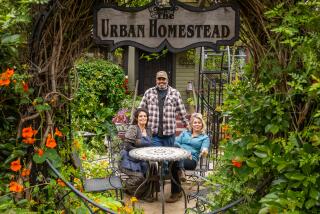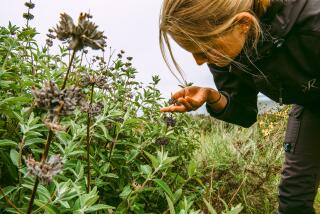Organic Farms Cultivate Volunteers on Vacation
- Share via
In 1972 a group of British environmental activists created a program that would enable vacationers to enjoy a free weekend on organic farms in Britain in exchange for performing light labor. It was obvious that the farmers offering such stays were as much interested in exposing the volunteers to their theories of farming as in obtaining assistance with the chores.
The organization was called Weekend Workers on Organic Farms and was given the striking acronym WWOOF.
Soon it was discovered that people were willing to work on those farms for longer than a weekend, and the name (but not the acronym) was changed to Willing Workers on Organic Farms.
The formula remained the same: In exchange for three to six hours a day of labor at unskilled tasks, participants receive free room and board during their stay.
WWOOF has since spread outside Britain, and today there are WWOOF opportunities on more than 600 organic farms in 50 countries, including the United States and Canada, as well as continental Europe, Africa, South America and Asia.
Most farms treat WWOOFers as respected guests, and the volunteers have active roles in determining the amount and type of work they are assigned. Possible tasks include picking fruit, herding sheep, milking cows, baking bread and painting the farmhouse.
WWOOFers usually spend about a week on one farm before heading home--or off to a different farm. Everyone must stay at least two nights. The maximum is six months, but you’ll need to work that out with the farmer.
To become a WWOOFer, you join the WWOOF organization in the country where you want to work. For $10 to $20 (it varies by country), you become a permanent member and you receive a list of all the farms accepting volunteers. You are responsible for making your booking.
Again, the primary aim is to encourage people to learn about organic growing. WWOOF also recognizes the cultural benefits of the program. By living and working with a family in Australia, Ireland, Ghana or Japan, they say, you gain an intimate understanding of life in that country without having to pay the higher costs of a tour. Your only expense besides the membership fee is for transportation to the farm.
The WWOOF International Web site is https://www.phdcc.com/sites/wwoof/index.html. It lists all countries with WWOOF organizations. Or you can access a more easily remembered site at https://www.wwoof.com. This one requires a bit of maneuvering to use (delete the cover item, then click on the British flag for an English-language version of the information). Or you can simply write to WWOOF International, P.O. Box 2675, Lewes BN7 1RB, England.
More to Read
Inside the business of entertainment
The Wide Shot brings you news, analysis and insights on everything from streaming wars to production — and what it all means for the future.
You may occasionally receive promotional content from the Los Angeles Times.










